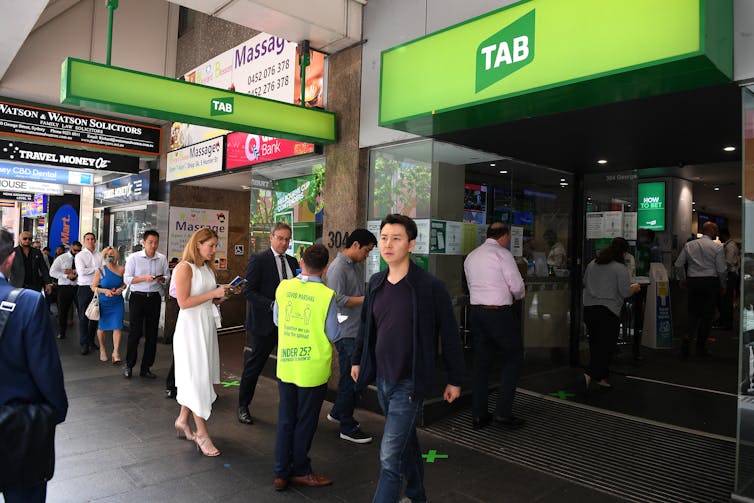Is the Melbourne Cup still the race that stops the nation – or are we saying #nuptothecup?
- Written by Alex Russell, Senior Postdoctoral Fellow, CQUniversity Australia

The Melbourne Cup is supposed[1] to be the “race that stops a nation”.
But among increasing community concern about gambling and animal welfare, does it stop us for the right reasons? As Cup Day dawns at Flemington, how is our relationship to the Cup changing?
Gambling in Australia
Gambling is a significant part of Australian culture. Helped by the fact we have pokies[2] in clubs and pubs, we lose more money on gambling than any other nation. Per capita, our gambling losses are more than double[3] those in the United States.
But research[4] shows gambling participation is dropping. A recently released study[5], led by Nerilee Hing at CQUniversity, and funded by Gambling Research Australia[6], was the first national gambling prevalence study since 2010-11. It included a telephone survey of 15,000 Australian adults in 2019, giving an insight into the nature and extent of gambling in Australia.
According to this report, 56.9% of those surveyed had gambled in the previous 12 months, compared with 64.3% the decade before. Participation on every gambling form has declined, apart from forms that were not available ten years ago, such as betting on e-sports[7] and gambling within video games[8]. Race betting has dropped from 22.4% to 16.8%.
What do people think of gambling?
Despite this decline, total race betting turnover[9] continues to climb, up by about A$4 billion in today’s dollars from A$22.9 billion in 2010-11 to A$26.9 billion in 2018-19.
This may be in part due to the rise in online gambling, which has doubled[10] over the past decade. Race betting is certainly more accessible than ever, with a lot of promotions[11] ready to entice you to place a bet, or bet more than you intended.
For many, however, a bet on the Melbourne Cup will be the only race bet[12] they place each year. The decline in race betting prevalence, despite an increase in turnover, suggests it is these less-engaged punters who are not betting anymore.
There certainly appears to be a growing concern about gambling in the community. A 2019 state government gambling survey[13] of more than 10,000 adults in New South Wales included a question about whether gambling has done more harm than good for the community. Of those surveyed, 46% strongly agreed gambling has done more harm than good, and a further 32% agreed. Only 8% disagreed or strongly disagreed.
Animal welfare
In 2020, the horse Anthony Van Dyck became the sixth horse to die[14] in the Melbourne Cup, and the seventh to die in a race on Cup day, since 2013.
These deaths have been met with mounting concern about the racing industry. A 2019 report[15] examining stewards’ documents from August 2018 to July 2019 found 122 horses died on race tracks in Australia. In 2019, the ABC’s 7.30 program aired an expose[16] on cruelty, with former racehorses being sent to slaughterhouses, despite animal welfare guarantees.
Earlier this year, Racing Victoria announced[17] it was implementing new measures to reduce risk to horses. Many of these appear to revolve around the Melbourne Cup in particular, especially international horses, given deaths in recent years have all been foreign runners. But for horses in the thousands of other races across Australia, the risks remain as real as ever.
Changing attitudes
The increasing visibility of the impact on animals has soured the Cup. A 2019 analysis[18] of Melbourne Cup tweets found that #nuptothecup was the third most popular hashtag associated with #melbournecup. The hashtags #horseracingkills and #animalcruelty also appeared in the top ten.
The hashtag #youbettheydie was also associated with #nuptothecup. These findings suggest the animal welfare issue is a strong driver of anti-Cup sentiment.
Increasing public awareness[19] of how the Cup (like other major sporting events) is accompanied by a spike in domestic violence has also tarnished the “feelgood” atmosphere.
Beyond the Cup, public opinion around horse racing is not reliably supportive. In 2018, the barrier draw for another prestige race, The Everest, was projected onto the Opera House sails. This was met with significant public outcry[20], despite the sails previously being used for projections about sport, including the Wallabies and the Ashes, and even for Samsung mobile phones. Protesters cited concerns about animal welfare and gambling.
What next?
This is not to suggest the race is going anywhere.
For many, the Melbourne Cup isn’t really about gambling, or even horses. It’s a reason to dress up and have a few (or more) drinks with friends. Or enjoy a sweep and some nibbles in the office. It’s also a welcome public holiday for Victorians.
But there is also a growing realisation[21] this party day has real costs to others.
Read more: Whether teams win or lose, sporting events lead to spikes in violence against women and children[22]
References
- ^ supposed (www.nma.gov.au)
- ^ pokies (australiainstitute.org.au)
- ^ more than double (www.nytimes.com)
- ^ research (www.gamblingresearch.org.au)
- ^ released study (www.gamblingresearch.org.au)
- ^ Gambling Research Australia (www.gamblingresearch.org.au)
- ^ e-sports (theconversation.com)
- ^ video games (parentinfo.org)
- ^ race betting turnover (www.qgso.qld.gov.au)
- ^ which has doubled (www.gamblingresearch.org.au)
- ^ promotions (responsiblegambling.vic.gov.au)
- ^ only race bet (www.racenet.com.au)
- ^ gambling survey (www.responsiblegambling.nsw.gov.au)
- ^ sixth horse to die (wwos.nine.com.au)
- ^ report (www.abc.net.au)
- ^ aired an expose (www.abc.net.au)
- ^ announced (www.racingvictoria.com.au)
- ^ analysis (www.marketingmag.com.au)
- ^ public awareness (www.dailytelegraph.com.au)
- ^ significant public outcry (www.theguardian.com)
- ^ growing realisation (www.abc.net.au)
- ^ Whether teams win or lose, sporting events lead to spikes in violence against women and children (theconversation.com)

















